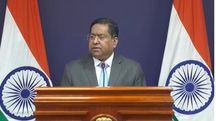India's Ruchira Kamboj assumes chair of 62nd Session of UN Commission for Social Development
In a tweet on July 27, Ambassador Ruchira Kamboj expressed immense pride in India assuming the Chairmanship of the 62nd Session of the Commission for Social Development.
 India's Ruchira Kamboj assumes chair of 62nd Session of UN Commission for Social Development
India's Ruchira Kamboj assumes chair of 62nd Session of UN Commission for Social DevelopmentIndia's Permanent Representative to the United Nations, Ambassador Ruchira Kamboj, has taken on the chairmanship of the 62nd Session of the Commission for Social Development, marking a momentous occasion as India holds this position within the UN agency for the first time since 1975. With a focus on bolstering international cooperation concerning social development matters, India's leadership aims to foster social justice and accelerate progress towards the implementation of the 2030 Agenda for Sustainable Development, particularly in the pursuit of poverty eradication.
In a tweet on July 27, Ambassador Ruchira Kamboj expressed immense pride in India assuming the Chairmanship of the 62nd Session of the Commission for Social Development. She reiterated India's steadfast commitment to lead with its core principles while diligently working for the welfare and prosperity of the global community.
The central theme for this session is "Fostering Social Development and Social Justice through Social Policies to accelerate Progress on the Implementation of the 2030 Agenda for Sustainable Development and to achieve the overarching goal of poverty eradication." This theme underscores the vital connection between social development and social justice as fundamental pillars in achieving the Sustainable Development Goals.
As the Chair of the 62nd Session, Ambassador Kamboj emphasized the commission's crucial role as an eminent intergovernmental body dedicated to addressing social challenges. Its purpose is to advise the United Nations Economic and Social Council (ECOSOC) on social policies of general character and matters in the social field not covered by specialized intergovernmental agencies.
The Commission for Social Development consists of 46 members, elected by the ECOSOC for four-year terms based on equitable geographical distribution. India, serving as a member of the 62nd session, will hold its term until 2027.
Since the World Summit for Social Development in Copenhagen in 1995, the Commission for Social Development has been the key UN body responsible for the follow-up and implementation of the Copenhagen Declaration and Programme of Action. The summit, held in March 1995, represented a consensus on the need to prioritize people at the center of development, pledging to conquer poverty, achieve full employment, and foster social integration as overriding objectives of development.
Copyright©2025 Living Media India Limited. For reprint rights: Syndications Today









